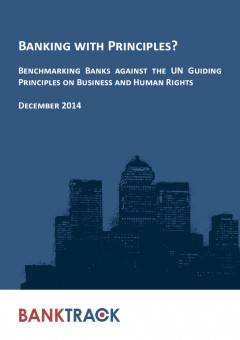
The UN Guiding Principles, while not perfect, provide the clearest expression yet of the international community’s expectations of the human rights responsibilities of corporations, including private sector banks. The most notable response by the banking sector to date has been the formation of the Thun Group in 2011 to discuss the implementation of the Principles, and their first discussion paper, launched in 2013.
More than one year from the launch of this paper, and more than three years from the launch of the Guiding Principles themselves, a new study released by BankTrack, “Banking with principles? Benchmarking banks against the UN Guiding Principles on Business and Human Rights”, attempts to assess how banks are doing at implementing the Principles into their own operations, policies and reporting.
The report assesses 32 large global banks against the UN Guiding Principles on Business and Human Rights, which set out the responsibilities of businesses to respect fundamental human freedoms. The report shows that, while some progress has been made since the Principles were launched in mid-2011, major gaps remain.
Of the 32 banks covered, half were found to have developed human rights policies that include a clear commitment to respect human rights. This is one of the most fundamental requirements of the Guiding Principles. A majority (17 out of 32) did not provide any reporting on human rights developments or impacts at the bank. None of the banks covered were found to have grievance mechanisms in place, meaning there are no transparent means for communities or individuals to raise complaints when they feel banks have caused or contributed to a human rights abuse. None had a clearly described process in place to remedy even those human rights abuses that the banks identified themselves.
